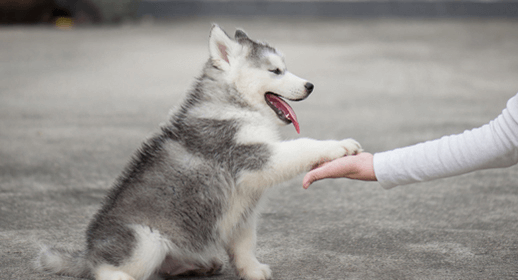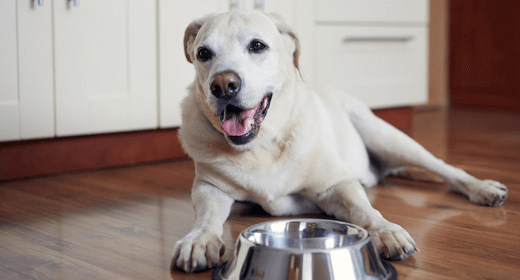

Join Expert Dog Trainer Kathy Santo as she goes through the basics of puppy obedience training. She’ll show you how to train your puppy to follow three basic commands: “sit”, “lie down”, and “stay. Then she’ll discuss how proper nutrition plays an important role in the overall training process.
Hi, I'm Kathy Santo with IAMS, and today we're going to discuss basic puppy obedience training. Obedience training is one of the best things you can do for you and your puppy. So this video will focus on the three basic commands: sit, lie down, and stay. A puppy can learn a great deal, even as early as seven weeks of age, if learning is fun and presented in the form of play. To establish a positive rapport with your puppy and prevent many future problems, start training a few days after your puppy settles in. A relationship based on friendship and trust will ensure that he tries hard to win you praise and approval. Before giving a word command to your puppy, speak his name to get his attention. Then speak a one word command, such as stay, sit, come, or heel. Your puppy won't respond to commands until he knows his name. Don't get impatient. The quickest way to teach your puppy his name is to reward him every time he looks at you. Always train when your puppy is hungry, lonely, or bored. When all his needs are met, he won't be as motivated to do as you say. For example, training right before meals will help him associate his meal with a reward for the training, and also make him more interested in the treat you use in your training session. Also, remember to use motivation, not negative reinforcement. Reinforce desired behaviors by offering toys, food, and praise, so the puppy wants to obey. Different dogs value different rewards. Some may think a tennis ball is the best thing in the world, while another puppy may find a tennis ball meaningless, but would do nearly anything for the chance to have a treat. Never use physical punishment on a young puppy, as you may scar him both mentally and physically. Also, refrain from calling your dog to come to you for punishment, because this will teach your dog not to come on command. Dogs can feel human emotions, so stay relaxed, firm, and confident. Be sure to keep any frustration out of the tone of your voice. And if you feel yourself becoming frustrated, take a break. Your dog can sense this, and will start to associate training with your unhappiness. Most puppies, like young children, enjoy learning, but have short attention spans. Training sessions should be frequent and short to prevent your dog from becoming bored. 10 to 15 minute sessions, two or three times a day, is ideal. The first command I'm going to show you is sit. Your puppy's on the leash, and you're sitting on the ground with a leash under your legs, so he can't take a field trip away from you. Hold your hand high over his head with the reward in it. Your dog will look up at the reward. Use your other hand to gently guide your dog into a sitting position, and say in a clear, firm, tone, 'sit,' while still holding the reward in the air above the dog's head. When your dog sits, give them the treat, and verbally praise him. The second command I like to teach is lie down. Have your dog sit. Let him know you have the treat, but don't give it to him. Slowly lower your hand with the treat to the floor to bring your pup's nose close to the ground. When he starts to follow it, say 'lie down.' Once he's fully on the floor, you can give him the treat. Repeat saying lie down and rewarding correct behavior. Now for stay. Have your dog sit. Let him know you have the treat, but don't give it to him. Go in front of your puppy, raise your open hand, and say 'stay' firmly, so your puppy can associate your open hand with what he's learning. Start to move away from your puppy while occasionally repeating the stay command. Start with only a few seconds of staying at a time, and then move to slightly longer amounts. Always come back and reward your puppy if he follows instructions. The last thing I'd like to talk about is nutrition, and its implications on puppy training. Good nutrition leads to a healthy dog with higher quality of poop, and more predictable and balanced behavior, so he's easier to train. Make sure your puppy is getting the well balanced diet he needs for optimal development. For more information on puppy nutrition, watch the video 'What is the best puppy food for your puppy?' I'm Kathy Santo with IAMS, and I hope that you found this helpful as you welcome your new addition into your family.


One of the most important things you can do is to feed your senior dog a diet formulated for his age featuring nutritional breakthroughs developed by the geriatric research team at The IAMS™ Company. As the years take their toll, a complete, well-balanced diet can help older dogs maintain health and ideal body weight, maximize their ability to stay healthy, and promote and maintain muscle tone and digestive health.
To call a dog 'old,' one mustn't consider chronological age, but rather physiological condition. Aging begins when the body's systems start to slow down when cells deteriorate faster than the body can repair them. Though the process is different for every animal (large and giant breeds tend to age faster than smaller breeds), dogs are generally considered seniors beginning at around 7 years (5 years for large and giant breeds). If you feed your dog a diet designed to address the nutritional needs of his age, you can best maintain your dog's overall health and well-being. As your dog ages, detecting and addressing signs of wear and tear or disease early might help your dog adjust more readily to his condition.
How your dog ages has much to do with genetics and environment, but nutrition plays an equally important role. The quality of the food and its ability to maintain and nourish your dog's cells can slow or delay the effects of aging and help promote a long, healthy life. As your dog ages and his systems become less efficient, he relies increasingly on the food you provide to make up for his body's shortfalls. According to Michael Hayek, PhD, a research nutritionist at The IAMS Company who specializes in geriatric nutrition, 'Aging dogs need the same nutrients as younger dogs; however, the quantity or the way the nutrients are provided may change.'
Dr. Hayek advises not waiting until you see signs of aging in your dog to consider the proper diet. Feeding a high-quality, premium diet throughout your dog's life is the best way to help him age gracefully. When your dog reaches the golden years, choose IAMS for nutrition suited to this stage of life. 'Good nutrition starts early,' says Dr. Hayek. 'It should be viewed as proactive health care because it may be a deterrent to aging later on.'
If your dog already exhibits signs of aging, look for a high-quality, balanced maintenance food that caters to his changing metabolism. When you're shopping for a formula that's right for your older dog, look for and compare these important features:
High-quality animal protein. Just like us, as dogs grow older, they naturally tend to lose lean body mass (muscle). High-quality protein becomes increasingly significant by providing the essential amino acids your dog needs to minimize the loss of lean body tissue. By nature, dogs are carnivores, and they do best on high-quality, animal-based proteins from sources such as chicken or lamb. Some people believe that aging dogs should be fed less protein to prevent or minimize kidney disease. However, the evidence is just not there. Reduced protein has a significant effect only after a certain level of renal dysfunction occurs. Signs of renal dysfunction include an increase in water consumption and increased urination. If you're concerned about your dog's renal health, your veterinarian can run tests to assess the level of renal function and recommend appropriate treatments if they are needed.
'If your dog is generally in a state of good health,' explains Dr. Hayek, 'protein should not be restricted. Rather, it should be available for building those all-important muscle reserves.' Some studies have shown that a diet of high-quality protein might actually help improve kidney function, and no research has indicated that low-protein diets slow the progression of renal damage in dogs.
Lower fat. Less-active, older dogs need fewer calories. Look for a food that's low in fat compared to our other adult formulas, but don't eliminate fat completely or feed a food that doesn't have enough fat. Pick a formula with at least 10% fat. Older dogs still need essential fatty acids. The inclusion of omega-3 fatty acids helps a senior dog maintain a proper fatty-acid balance as the body's fatty-acid synthesis naturally decreases.
Moderately fermentable fiber. The goal of fiber is to help maintain optimal intestinal health. 'You want to aim for consistent stools,' explains Dr. Hayek. The goal is to promote digestibility and the ability to process food and absorb nutrients. At the same time, fiber levels should promote and maintain a healthy intestinal tract, which often can be problematic for older dogs. A fiber level of no more than 5% is appropriate for seniors to maintain an optimal intestinal environment for a healthy gut, which helps result in excellent nutrient absorption and small, firm stools. IAMS includes dried beet pulp, a patented fiber source, in all of its foods to make elimination easier and regular. According to Dr. Hayek, if you've been feeding your dog properly all along, fiber requirements shouldn't change.
Fructooligosaccharides (FOS) are a unique fiber source. FOS is a moderately fermentable fiber which can help maintain a healthy intestinal environment.
Antioxidants. These help maintain balance within the body by ridding it of harmful compounds called free radicals, which increase as a dog ages. Antioxidants fend off free radicals and help protect cell membranes and DNA. To maintain your older dog's immune-system response, feed a formula with important antioxidant nutrients such as vitamin E and beta-carotene.
Vitamins and minerals. A high-quality, nutritionally balanced dog food should include all of the essential nutrients in the proper proportions. Some say that vitamin and mineral supplements are necessary as a dog's systems age. The fact is that, unless your veterinarian specifically identifies a deficiency, vitamin and mineral supplements are unnecessary and, in some cases, might do more harm than good by creating an unhealthy imbalance.
Balanced feeding is vital as a dog ages, but it's just as essential throughout his life. The longer and more consistently you feed him a healthy diet for his life stage, such as IAMS ProActive Health™ Senior Plus, the greater his chances of living a long, healthy life. As your dog reaches the senior years for his breed or size, remember these tips:
Finally, Dr. Hayek points out that there's still much to learn about canine geriatric nutrition. For now, realize that every animal ages at a different rate and in different ways. Monitor your dog and especially watch for changes after 7 years of age (5 years for large and giant breeds). With the help of your veterinarian and responsible pet food manufacturers, your pet can live to a comfortable, healthy old age.